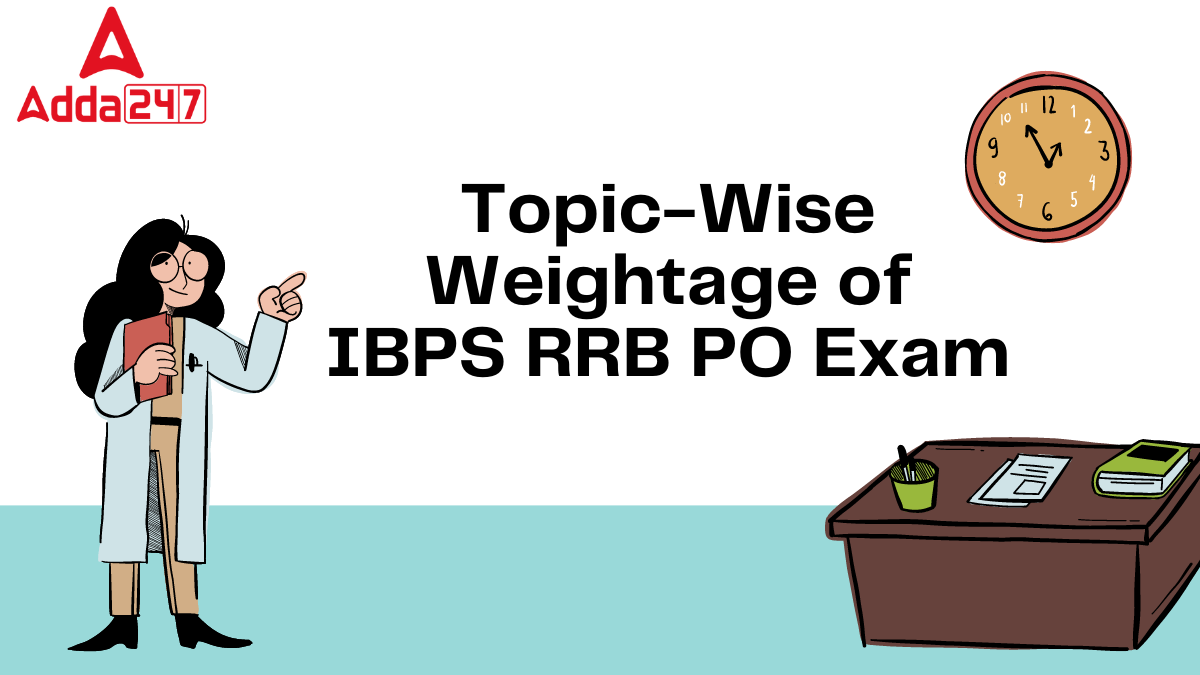Understanding the topic-wise weightage in the IBPS RRB PO Exam is crucial for smart preparation. By analysing past year trends, aspirants can identify high-priority topics and allocate their time accordingly. The Reasoning and Quantitative Aptitude sections, each carrying 40 marks, play a key role in the Prelims. With recurring patterns and dominant topics in both sections, a topic-wise strategy can significantly boost your chances of clearing the cutoff.
IBPS RRB PO Exam Structure
The IBPS RRB PO exam is conducted in three phases
- Preliminary Exam
- Mains Exam
- Interview
Here’s a breakdown of the sections in each stage:
- Preliminary Exam (80 Marks)
- Reasoning Ability (50% = 40 marks)
- Quantitative Aptitude (50% = 40 marks)
- Main Exam (200 Marks)
- Reasoning Ability (25% = 50 marks)
- Quantitative Aptitude (25% = 50 marks)
- English/Hindi Language (20% = 40 marks)
- General Awareness (20% = 40 marks)
- Computer Knowledge (10% = 20 marks)
Candidates should do smart work to increase the chance of selection and secure a position for IBPS RRB. They should prepare according to the topic-wise weightage. For Example, as in the prelims exam, Data Interpretation constitutes approximately 25% to 40% of the Quantitative Aptitude section, while more than 50% of the reasoning section questions come from Puzzles and Seating Arrangements.
Topic Wise Weightage in IBPS RRB PO Exam
Topic-wise Weightage of Reasoning
The reasoning section tests the candidate’s logical thinking and problem-solving skills. Here is the weightage for various topics.
| Topic-wise Weightage of Reasoning | ||||||
| Topic | Overall | 2024 | 2023 | 2022 | 2021 | 2020 |
| Puzzles and Seating Arrangement | 20-25 | 24 | 23 | 20 | 22 | 25 |
| Alphabet/ Number Series | 2-3 | 1 | 0 | 3 | 0 | 3 |
| Inequality | 3-5 | 4 | 4 | 4 | 5 | 3 |
| Blood Relation | 2-4 | 3 | 0 | 4 | 3 | 0 |
| Syllogism | 2-3 | 3 | 3 | 3 | 3 | 0 |
| Direction Sense | 3-4 | 3 | 3 | 3 | 4 | 3 |
| Coding-Decoding | 4-5 | 0 | 5 | 0 | 0 | 5 |
| Miscellaneous | 3-4 | 2 | 2 | 3 | 3 | 1 |
| Total | 40 | |||||
Analysis of the Topic-wise Weightage of Reasoning from the above table:
- Puzzles and Seating Arrangement continue to dominate the section with 20–25 questions consistently, making them the most important topics to master.
- Inequality appears regularly with 3–5 questions each year, showing its consistent presence in the exam.
- Syllogism and Direction Sense have also maintained a steady presence, usually contributing 3–4 questions.
- Coding-Decoding shows variation, absent in some years but returned strongly with 5 questions in 2023 and 2020.
- Alphabet/Number Series and Blood Relations appear intermittently, so they should not be ignored completely.
- Miscellaneous reasoning questions, though fewer, can test a variety of logic-based topics, making them worth light revision.
Topic-wise Weightage of Quantitative Aptitude
Quantitative Aptitude assesses numerical ability and analysis. The topic-wise weightage is tabulated below
| Topic-wise Weightage of Quantitative Aptitude | ||||||
| Topic | Overall | 2024 | 2023 | 2022 | 2021 | 2020 |
| Data Interpretation | 10-17 | 11 | 15 | 13 | 17 | 10 |
| Simplification & Approximation | 4-5 | 5 | 4 | 5 | 5 | 0 |
| Quadratic Equation | 3-5 | 5 | 2 | 5 | 0 | 5 |
| Number Series | 5 | 5 | 5 | 5 | 6 | 5 |
| Arithmetic | 12-13 | 14 | 12 | 12 | 12 | 15 |
| Miscellaneous | 3-5 | – | 2 | – | – | 5 |
| Total | 40 | |||||
Analysis of the Topic-wise Weightage of Quantitative Aptitude from the above table:
- Arithmetic is the backbone of the section, consistently contributing 12–15 questions every year.
- Data Interpretation (DI) also holds major weight, with 10–17 questions based on charts, graphs, and tables—crucial for scoring high.
- Number Series is a scoring topic, with 5 questions appearing every year without fail.
- Simplification & Approximation remain common, especially for candidates targeting speed-based scoring.
- Quadratic Equation questions have appeared variably but remain important when present.
- Miscellaneous questions vary by year, so it’s useful to brush up on topics like probability, ages, partnerships, etc.
Knowing the topic-wise weightage for the IBPS RRB PO Exam helps candidates in their preparation and focus on areas that carry more marks. With structured preparation and consistent practice, candidates can enhance their chances of success in this competitive exam. Good Luck!
| Related Posts | |
| IBPS RRB Preparation Tips | IBPS RRB PO Salary |
| IBPS RRB PO Cut Off | IBPS RRB PO Syllabus |





 Daily Current Affairs Quiz 23rd February...
Daily Current Affairs Quiz 23rd February...
 Bank of Baroda Office Assistant Exam Ana...
Bank of Baroda Office Assistant Exam Ana...
 Bank of Baroda Office Assistant Memory B...
Bank of Baroda Office Assistant Memory B...








